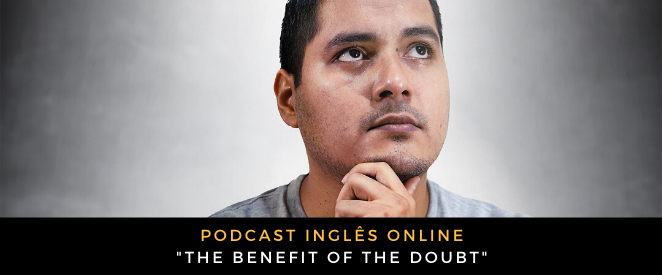Podcast: Download
Assine:
How’s it going? Hoje falo sobre aquela famosa expressão – tanto em inglês quanto em português… o benefício da dúvida. Alguém já falou isso para você? Ouça o episódio de hoje para se familiarizar com este idiom.
Transcrição
Hi, guys, how’s it going? This is Ana with the Inglês Online podcast.
I wanted to thank everyone who left a review for the podcast recently, thank you so much… and wanted to ask you guys: if you’ve been listener for a while, if you enjoy the podcast please head over to iTunes or the Apple store or the Podcasts app on your iPhone and leave a review for the podcast. And if you use Google podcasts please do the same. It really helps the podcast become… you know, better known and more people will get to listen to it, because they’ll see the reviews and be interested. If you leave a nice review, that is!
Let’s just get to it and start the new episode. Today I wanted to talk about this expression or idiom, or whatever you want to call it, which is the benefit of the doubt. We use the same expression in Portuguese with the same words and here at Inglês Online we published an article, an English tip featuring this expression a while ago… But I thought this expression is popular enough… It’s common enough that it deserves a podcast episode, so here it is.
The benefit of the doubt. When do you give someone the benefit of the doubt? It’s usually… it’s usually when you don’t know them very well, I would say. Because if you know someone very well… you know if they’re telling the truth or not. Generally you know if someone is telling the truth or not when you know them very well. So if you don’t know someone very well, if your relationship with this person is not very close – it’s not a very close relationship, then something happens and you give them the benefit of the doubt. So, what kind of thing?
Let’s say you’re talking to your friend… your good friend, your good friend Jack. You guys have been friends for a while and Jack’s mate, whom you don’t know very well… Paul. Paul is there as well, Paul is listening to the conversation and you don’t know Paul very well. So you and Jack get to talking and you end up sharing with Jack that you’re planning a birthday party for your cousin, let’s say. The next day, your cousin Kelly gives you a ring and says: “Hey, I heard you’re planning my birthday party. That’s so cool”. And you know, there goes the surprise… There’s no surprise anymore.
She heard the news that you’re planning her surprise party. And you ask her “Who told you?”, and she says: “Ah… I’m not going to tell you, because I don’t want you to be mad at the person who told me. It’s okay, don’t worry”. But you know what, you are a bit mad, because when you were talking the only person you told about this was Jack and inadvertently you also told Paul, because you forgot that Paul was right there, you were talking to your friend Jack and you told Jack that you were planning Kelly’s surprise party.
But you know that Paul heard you. So now you’re thinking… it has to be Paul! Because, I mean, Jack is my buddy, Jack has been my friend for years, he would never do that, he knows to keep a secret, he knows it’s my secret, he would never go and tell Kelly. It has to have been Paul.
You talk to Jack, and Jack says: “Hey, no, it can’t be Paul, he’s such a good keeper of secrets, he would never do that and also he doesn’t know your cousin”. And you say: “Ok, well… I’ll give him the benefit of the doubt”. Meaning you’re not sure that it wasn’t him, but you’re also not sure that it was him. Since you don’t know this person very well, OK… “I’ll give him the benefit of the doubt”. You’re still going to talk to Paul, maybe you’ll become friends… You know, you’re not sure one way or another. You’re giving him the benefit of the doubt.
Now, this is an expression that if you say to a friend of yours or someone that is close to you… “I’m giving you the benefit of the doubt” – it sounds slightly aggressive in my opinion. Because basically you’re telling this person that you don’t trust them. You’re telling them that you’re not sure if they’re telling you the truth, so… Don’t say this expression lightly to someone unless you don’t really care what they’re going to think. Because if it’s someone that you know, if it’s a friend or family member, again… basically you’re telling them “I don’t really trust you”.
That’s it for today. Let me know in the comments if you have ever said the benefit of the doubt either in Portuguese or in English and talk to you next time.
Key expressions
Vocabulary
get to talking = começa/inicia uma conversa
end up = “acabar” no sentido de terminar fazendo algo que você não estava necessariamente planejando fazer
inadvertently = sem querer, inadvertidamente
say something lightly = dizer algo de forma inconsequente ou sem levar muito a sério, na brincadeira
Clique para ler a dica Benefit of the doubt
Ana criou um blog de dicas de inglês em 2006, e depois de muito pesquisar o que faz alguém ganhar fluência numa segunda língua, criou seu primeiro curso de inglês em 2009.


